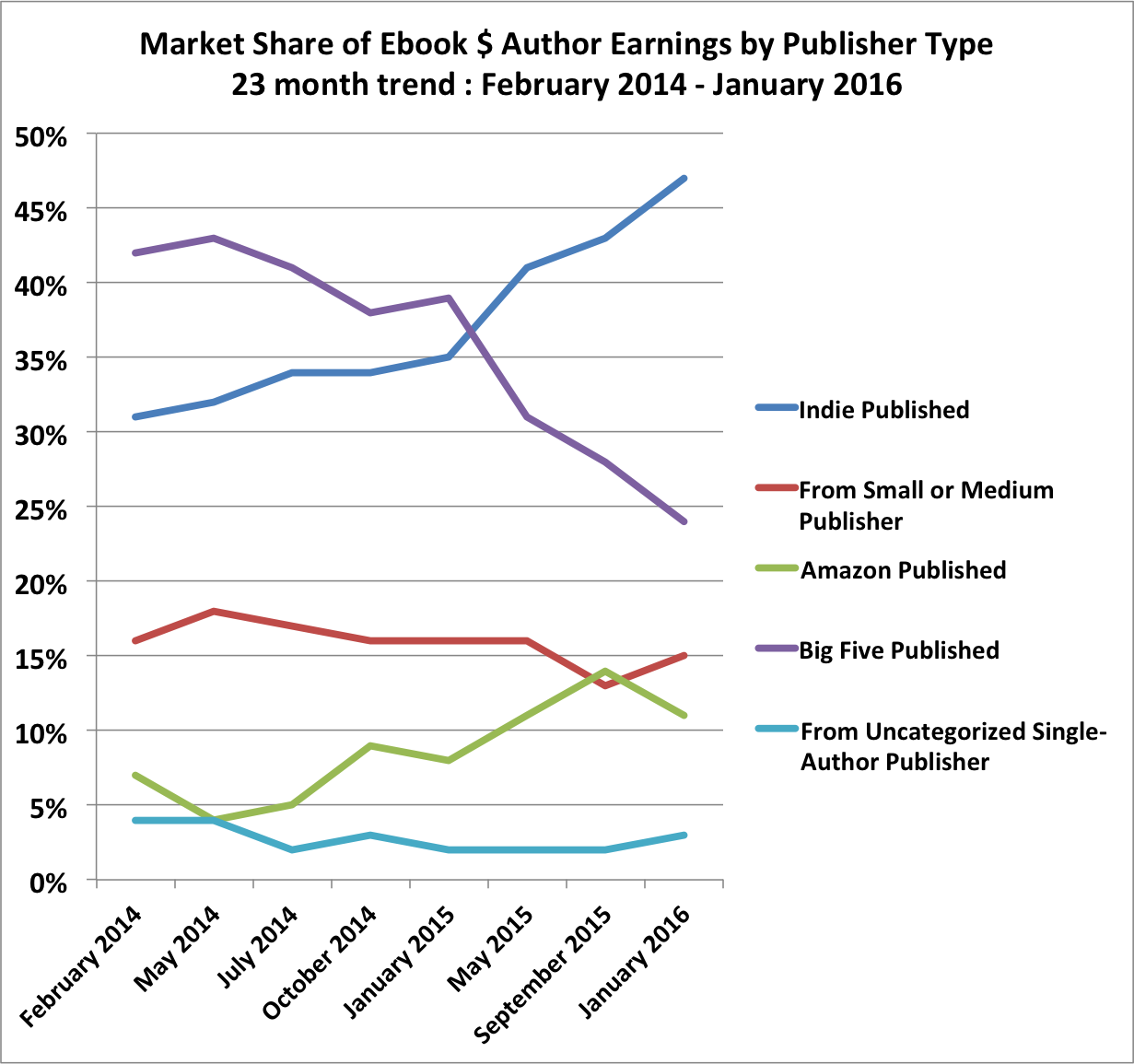This week, AuthorEarnings.com turned 2 years old. To celebrate, we released our latest quarterly report on Kindle ebook income.* We also looked at print and audio in this report, something we will be tracking in the future. Also, Data Guy revamped our methodology to double-check our previous work. Turns out the old methodology was spot-on when it comes to relative market share by publishing type. Here’s the crazy bit: Check out the 23-month trends on author earnings by publishing path:
Things look rosy for authors who are retaining their rights. They don’t look so great for authors who sign with major publishers without also negotiating price ceilings for their ebooks. This is something I’ve been advocating for years. If you sign with a publisher, get your max ebook price in writing. Make sure it’s in the contract. Don’t leave this crucial decision up to the whim of your publisher or editor. The #1 obstacle to your ebook being given a chance by new readers is how much they’ll have to pay. And if you think your publisher understands this and has your best interests in mind, you’d be wrong.
Last year, publishers negotiated furiously with Amazon for the right to institute higher ebook prices. This is the same power they craved when they colluded with one another in conjunction with Apple, who was found guilty for the role they played and levied with enormous fines. The publishers knew they were busted and took a deal. In trial testimony, it was shown that they believed higher ebook prices were necessary to slow the adoption of ebooks and protect the print business.
This is critical to understand if you are a trade fiction author, because more than half the market is now in ebooks, and half of what’s left is online print sales. 75% of your market is online, and publishers are willing to nuke your career in order to protect historical relationships with the 25% that’s left. We have this in their own writing. This is not speculation. Even industry insider Mike Shatzkin has blogged about this strategy and how it has backfired. Look at the trend lines above and see what publishers are willing to do. The dive in the purple line corresponds with a return to Agency pricing. Note who is being harmed.
Publishers are giving up market share to independent authors, who are gobbling it up gladly. This matters to you, as an author. You cannot go into negotiations with a publisher assuming that their only goal is to sell as many of your books as possible. That is certainly a goal, and we can assume a rather high one. But above selling tons of your books is selling lots of another in-house author’s books, which is why they will get frontlisted while you are in the middle or back of a catalog. A higher goal as well will be to protect relationships with distributors, resellers, journalists, and reviewers. Understand how these goals might conflict with one another and where you are likely to be on the hierarchy. Most of all, don’t take chances when it comes to critical decisions on your books such as price. Good publishing contracts give authors the right to approve cover art. They should give authors the right to decide how much readers pay for their work.
Granted, you might not be concerned with your ebook’s price. There are authors who aren’t. There are even bestselling authors who blast their readers for expecting affordable ebooks, equating this with a sense of “entitlement” and accusing their readers of having a “Walmart mentality.” But then there are the authors who have approached me at conventions, lamenting the price of their debut novel’s ebook edition, and asking if there’s anything they can do. Their established fanbase is balking at paying $14.99 for an ebook. Do they have any recourse?
Yes, they do. But only during the negotiation phase. When negotiating with publishers, price is always something my agent and I discuss. When negotiating with publishers for the rights to WOOL, I had a max ebook price in the deal memo ($6.99). We went back and forth on this price point, just as we would on advance size and royalty rates. This is negotiable, and publishers will make allowances. If they won’t, you know where they stand: For ridiculous ebook prices that will hamper your readership and diminish your earnings. If they won’t budge, you know to be wary and to walk away.
The fight over ebook pricing will continue. For now, it’s largely been a fight between retailers like Amazon and publishers like Hachette. Like parents who can’t get along, it’s the kids who end up taking the brunt of the abuse. It’s time for authors to understand that they aren’t powerless children, standing by. If you have an agent and are pursuing a publishing deal, negotiate a max price right in your contract. And fight for a number of “freebie” days and for the ability to accept promotional opportunities from retailers who offer to slash prices and boost sales.
Self-published authors have all these powers, but this need not be an exclusive club. Every author should care about what goes on the cover of their works, in addition to the manuscript that makes up the interior. And nothing is more important on the cover of that work than the price. Don’t leave this up to the publisher. And only work with a publisher that is willing to work with and partner with you. You know your readership better than they do. Over half your readers are now reading digitally. Keep this always in mind.
* To be fair, we were going to release a quarterly report with or without the birthday.




Leave a Reply